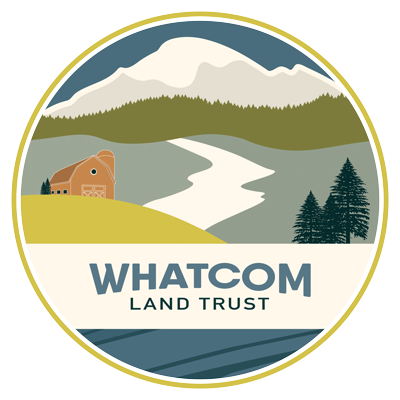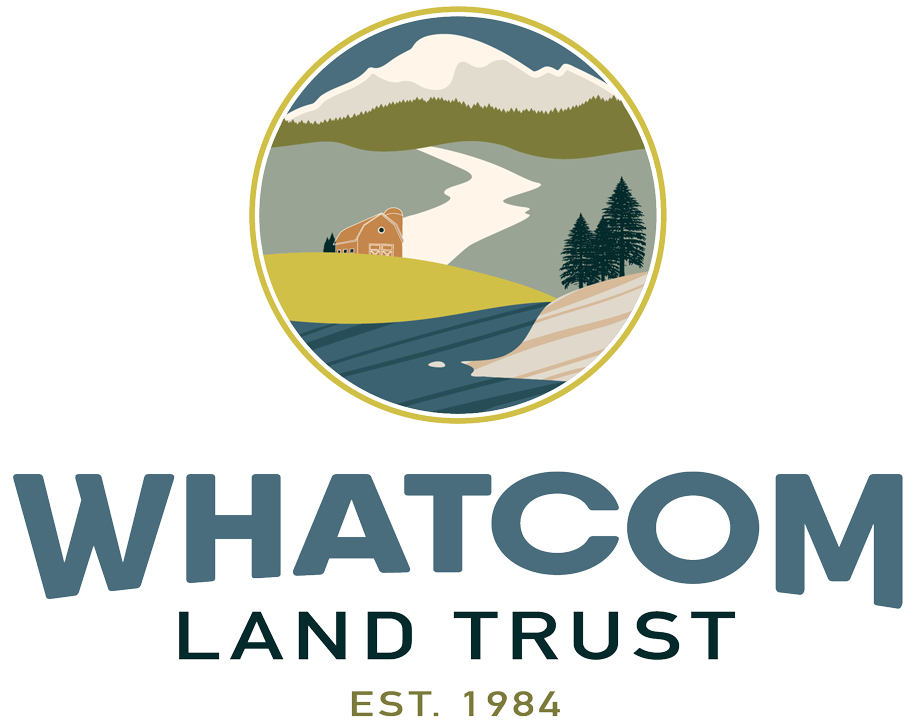Caring for Land Forever
An interview with Whatcom Land Trust Stewardship Director Jenn Mackey
Jenn Mackey sits down with her laptop, her six-month-old daughter Maizee, a (now cold) mug of tea, and a look of determination. This is the status quo for Whatcom Land Trust’s Stewardship Director, who leads a coalition of staff and dedicated volunteers to care for Trust properties.
November is the height of the busy fall season, so we were lucky to grab Jenn for a conversation about the evolution of Whatcom Land Trust’s stewardship work.
WLT: Whatcom Land Trust just entered its 39th year as an organization protecting land in Whatcom County. What does that mean for stewardship?
Jenn: A lot of people don’t realize that when we protect land forever, that also means we take responsibility to care for land forever. We commit to monitoring and managing conserved property in perpetuity – and that puts us in a unique position to think about long-term care for our properties.
The stewardship part of our business has experienced substantial growth. Not only are we working on new properties and projects, we are also providing long-term care and planning for properties we’ve held for decades.
WLT: What Whatcom Land Trust property provides an example of long-term care for land?
Jenn: The Fenton Nature Reserve is a great example of stewardship priorities evolving with the needs of a specific property. Initially, we had to protect an existing second-growth forest that was healthy and functioning. There were also parts of the property where we saw opportunity for restoration, primarily along Haynie Creek. We’ve done a lot of work planting next to the creek, with restoration efforts benefitting spawning coho salmon.
One of our Volunteer Land Stewards at Fenton, Hank Kastner, has been helping out at the property for several years. He’s walked the creek many times, and can note when there are substantial changes. In recent years, he saw coho salmon come up the creek and spawn for the first time – we hadn’t seen that in the early years stewarding the property.
The restoration work isn’t done – we are still doing maintenance of the plantings on the creek, working with a biologist, Greg Green, to turn the old pumphouse into a bat brooding structure, and managing human use.
WLT: What role do volunteers play in long-term stewardship?
Jenn: Our volunteers have critical and in-depth relationships with the land, and help us stay in touch with the unique needs of our properties. Without volunteers, we couldn’t get our work done.
Volunteers also inspire our staff – their community involvement and support keeps us motivated and excited about our work. We have over 700 volunteers involved with stewardship work on an annual basis. That’s a huge number, and we’re always looking for more. Volunteers are one of the primary reasons we are able to be such effective stewards in Whatcom County, how we can be in multiple places at once.
I still remember a work party at the Lower Middle Fork Complex. The vines of the English ivy were the circumference of oranges, and covered most of the trees on the property. The look on the volunteers faces when I said we were going to be hand removing it all – unforgettable. They were like “how is this going to be possible?” It’s so daunting.
We’ve now hosted multiple work parties over five years, and we’re seeing substantial changes on the property. Most of the ivy is removed. We will continue to do this until the ivy has been eradicated. Volunteers are the reason we have the capacity to care for all our properties consistently.
WLT: Whatcom County will face some daunting challenges in the next century. How is the stewardship team working to prepare for climate change?
Jenn: One of the key things is we’re remaining adaptable as we learn more about what Whatcom County will look like in 10 years versus 50 years versus 100 years. We’re thinking about what will grow now, and what will grow in the future.
One of the amazing and unique things about leading stewardship work for the Land Trust, is that we manage properties forever. We have a long-term vision for our properties. Instead of having a five-year time frame, we look long term and are able to manage properties as stewards who really know the land, are adaptable, and are present to care for our properties.
–
As we wrap up our conversation, Jenn reminds me that “stewardship never ends. We’re working to protect and care for land every day. Forever really does mean forever – and we need all the support we can get!”
Want to get involved? Attend these upcoming work parties, sign up as a volunteer, or give to support Whatcom Land Trust’s ongoing stewardship work.


